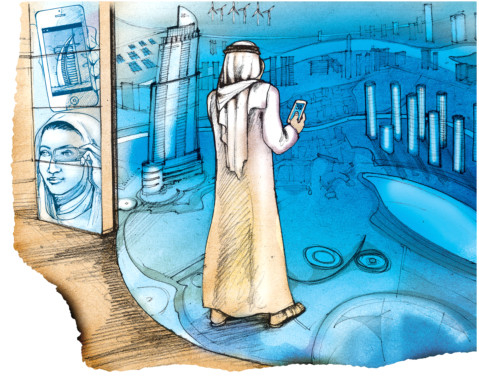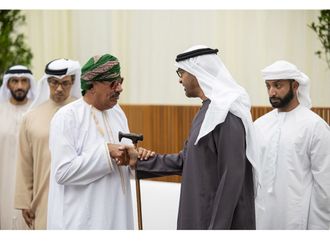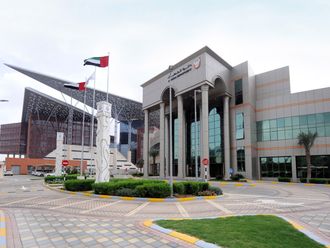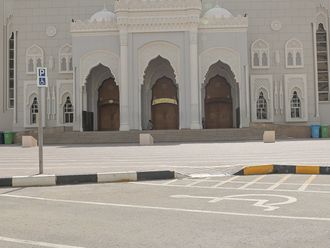
Yes, 2015 was the year we were all supposed to be zooming around in flying cars, but while Marty McFly got that bit wrong, we are one step closer to future mobility — flying firefighters.
Dubai Civil Defence last month signed a deal for 20 jetpacks, each capable of reaching a height of 1,000 feet and a top speed of 72km/h. These will be invaluable in search-and-rescue operations, such as during a fire in any of the skyscrapers lining the cityscape.
The BBC notes that jetpacks are still so futuristic that many aviation authorities have not even considered their use yet. Dubai will be the first city to bring this James Bond-style concept to reality.
And why the UAE? As Jim Krane, author of Dubai: The World’s Fastest City, tells the BBC, “This is their modus operandi — they like to take the first-mover advantage in just about anything. If something looks kind of crazy and you need a test bed or market to try it, Dubai’s your place.”
The news service says the UK Fire Officers Association will be watching the emirate to see how the jetpacks pan out, along with the rest of the world, no doubt.
Innovation first
The UAE government has designated 2015 as the Year of Innovation, in line with a national strategy to make the country the most innovative in the world by 2021. As His Highness Shaikh Mohammad Bin Rashid Al Maktoum, Vice-President and Prime Minister of the UAE and Ruler of Dubai, pointed out, innovation is the only way to build a great history for the UAE: “The future will be for those who adopt innovation.”
Areas that get special attention include renewable energy, education, transportation, health care, water management and space. And over the next three years, as part of the first phase, around 30 national initiatives will be executed. These include everything from new legislation to private sector incentives, incubation centres and international partnerships.
The National Innovation Committee, with its members drawn from various federal government agencies, will keep track of the progress made.
In addition to the country’s ongoing smart city objectives, here are a few areas where the UAE leads innovation in its quest to become the smartest city in the world.
Drones
It is not just firefighting where Dubai is trying out lateral thinking. The city’s police force will be among the first in the world to deploy drones in its operations — with locally produced craft no less. Called Sanad, the Dh100,000 drone is made of light carbon fibre and has eight rotors instead of the normal four, enabling it to carry 50kg.
Meanwhile, the annual UAE Drones for Good competition is dedicated to “transforming the innovative technologies behind civilian drones into practical, realisable solutions for improving people’s lives today”. The international winner gets $1 million (Dh3.68 million), while a cool Dh1 million awaits the best entry in the national competition.
At February’s award ceremony, Sheban Naim, Managing Director of Airspectiv Media, told Gulf News Dubai’s drone industry is ready to operate on a larger scale. “Over the next five to six years, Dubai is probably going to be the central hub for drones worldwide and the main reason for that is Dubai is a transportation hub.”
The UAE government estimates the civilian drone industry will be worth $10 billion and generate 100,000 jobs by 2025. Regulations for the use of drones are also being developed.
IoE
According to the 2015 Global Information Technology Report, the UAE ranked 23rd of 143 countries on the World Economic Forum’s Network Readiness Index. That puts it ahead of other Arab nations. In the previous year’s report, the country was second globally in Government Usage of ICT. A fitting example of this is Dubai Now, a smart hub launched in October that allows users to access 22 governments from their smartphones. These services cover virtually every touch point between citizens and the government, such as payments and bills, housing and transport, health, security and justice, education, business, public amenities and Islamic services.
Residents can also tap into the Sahel network of electronic services and payment systems.
Interestingly, this is not a one-way communication between the government and residents. The newly launched Mohammad Bin Rashid Smart Majlis — an online platform — allows everyone to “participate in building the future of Dubai”, by sharing their ideas and solutions.
Networking tech giant Cisco has said that the internet of everything (IoE) — connections between people, process, data and objects — can create “unprecedented opportunities” for the UAE’s citizens, and public and private sectors. IoE will also be a backbone of UAE’s smart city initiatives, and power everything from buildings to water management systems.
The Dubai Electricity and Water Authority (Dewa) is working on a smart power grid, and other initiatives like electric vehicle charging stations — 100 such stations are expected by the end of the year, capable of providing 80 per cent of charge in just 20–45 minutes. Dewa’s Smart Palm project has also been well received. The solar-powered structures provide free Wi-Fi and charging points in popular spots such as parks and beaches.
Even the banking sector is innovating. The US-based consultancy Synechron recently opened the Digital Innovation Centre in Dubai to showcase futuristic technologies such as smart ATMs, talking robots and virtual reality systems.
5G
High-speed networks will be the backbone of the smart city initiatives. In October, telecom operator Etisalat announced the UAE will be the first country in the world to see a nation-wide rollout of a 5G network, in time for the Expo 2020. Ahmad Julfar, CEO of Etisalat Group, said 5G connectivity will transform the Expo 2020 site into the “smartest district of the future”, as the expected 25 million visitors as well as citizens across the UAE soak in the fastest mobile technology capable of delivering gigabit-per-second downloads — which means a full HD movie can be on your system in only minutes.
Biometrics
At this year’s Gitex Technology Week, the UAE’s Ministry of Interior (MoI) displayed an advanced facial recognition system that automatically identifies suspects, even in moving vehicles. It can also read license plates, and is one of the many initiatives that aim to make the UAE an even safer place.
Similarly, the e-Border project leverages iris and facial recognition technology for border control. Visitors to the International Defence Exhibition and Conference observed MoI’s showcase of smart tracking systems, safety management, traffic accident analysis, and the smart traffic awareness system.
One of the results of deploying advanced systems in large numbers is that the country has become a hotspot for biometrics solutions. In a May report, research firm MarketsandMarkets projects the global biometrics systems market to reach $24.4 billion by 2020, growing at a compound annual growth rate (CAGR) of 17.9 per cent over the next four years. However, analysts from TechNavio forecast that biometrics in the Middle East will grow even faster — at a CAGR of 19.35 per cent over the period 2014-19.
The big picture
The UAE’s investment in innovation is estimated at Dh14 billion annually, half of which is spent on research and development. However, the UAE Vision 2021 calls for that number to be ramped up to 1.5 per cent of GDP. Elsewhere, the 2014 Global R&D Funding Forecast by US research firm Battelle Memorial Institute pegs R&D spending in China at around $284 billion, or 1.8 per cent of GDP. The US tops the list at $465 billion, or 2.8 per cent, while Japan comes third with $165 billion, or 3.4 per cent. The other target for 2021 is to reach 20 on the Global Innovation Index, up from the 2014 rank of 36.










